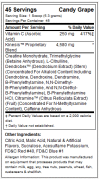Effects of a pre-workout supplement on lean mass, muscular performance, subjective workout experience and biomarkers of safety
- PMID: 24465156
- PMCID: PMC3894395
- DOI: 10.7150/ijms.7073
Effects of a pre-workout supplement on lean mass, muscular performance, subjective workout experience and biomarkers of safety
Abstract
In this prospective, randomized, double-blind, trial conducted in two parts, we examined the effects of a multi-ingredient pre-exercise workout supplement blend of creatine, betaine and a dendrobium extract (MMP) on safety, performance, and body composition in healthy men and women undergoing a supervised program of resistance exercise. Part 1 was an acute hemodynamic safety study wherein forty young, healthy men and women (26.2 ± 5.3 years, 70.4 ± 3.3 inches, 83.7 ± 14.9 kg, 26.0 ± 3.2 kg●m(-2)) ingest one dose of either the MMP or comparator in a randomized, double-blind, comparator controlled, crossover fashion before having their resting heart rate, blood, ECG and comprehensive blood chemistry and blood counts completed. Systolic (SBP) and diastolic (DBP) blood pressures were generally raised (3.0-5.4 mm Hg, p<0.01) following supplementation with MPP whereas in the comparator group SBP was marginally reduced by 0.3 to 1.2 mm Hg, p>0.05 at all time points) and DBP was increased (3.0 - 3.9 mm Hg, p<0.05 at all time points). No changes in EKG-corrected QT interval were observed, and no serious adverse events were reported. Part 2 was a six-week training study wherein forty-three young, healthy men and women (24.3 ± 2.9 years, 70.5 ± 3.1 inches, 83.8 ± 9.6 kg, 26.1 ± 2.7 kg●m(-2)) supplemented with daily pre-workout doses of either the MPP or a comparator in a randomized, double-blind, comparator-controlled fashion while following a standardized resistance training program for six weeks. MPP and the comparator were isocaloric and delivered the same amount of caffeine. Significant improvements in visual analog scale (VAS) scores for energy (p<0.024) and concentration (p<0.041) were found along with consistently higher levels of focus accompanied by less fatigue when MPP was consumed in comparison to comparator during upper body muscular strength-endurance tests at weeks 3 and 6. MPP supplementation for 6 weeks did not improve dual-energy x-ray absorptiometry (DEXA) measures of body composition or objective assessments of exercise performance. Overall, MPP use and administration was well tolerated. Self-reported scores for energy and concentration were significantly greater. Over a six-week training and supplementation period, MPP use was not associated with improvements in performance or body composition. Future studies should confirm these effects over a more prolonged training period.
Keywords: botanicals; caffeine; creatine; dendrobium; dietary supplement; pre-workout; safety; sports nutrition.
Conflict of interest statement
Competing Interests: The authors declare that they have no competing or financial interests concerning the outcome of this investigation. The sponsor of this study, Driven Sports, Inc. (Franklin Square, NY) provided an independent research grant and donated product, but had no role in the collection, analyses, or interpretation of the data.
Figures
References
-
- Fukuda DH, Smith AE, Kendall KL, Stout JR. The possible combinatory effects of acute consumption of caffeine, creatine, and amino acids on the improvement of anaerobic running performance in humans. Nutrition research. 2010;30:607–14. doi:10.1016/j.nutres.2010.09.004. - PubMed
-
- Kraemer WJ, Hatfield DL, Spiering BA, Vingren JL, Fragala MS, Ho JY. et al. Effects of a multi-nutrient supplement on exercise performance and hormonal responses to resistance exercise. Eur J Appl Physiol. 2007;101:637–46. doi:10.1007/s00421-007-0535-3. - PubMed
Publication types
MeSH terms
Substances
LinkOut - more resources
Full Text Sources
Other Literature Sources
Medical




